ECO 4012: UK Macroeconomic Policies & Impact on Economic Welfare
VerifiedAdded on 2023/06/12
|11
|3622
|120
Essay
AI Summary
This essay provides an analysis of macroeconomic policies and their impact on economic welfare, specifically focusing on the United Kingdom. It begins by defining macroeconomics and its objectives, such as maximizing living standards, controlling inflation, reducing unemployment, and achieving sustainable economic growth. The essay then examines how the UK government uses macroeconomic policies, including fiscal and monetary policies, to improve economic welfare through various factors like labor market improvements, reduction of gender disparities, increased financial inclusion, and wage differentials. It also addresses the challenges faced by the UK government in the last decade, including issues with monetary and fiscal policy implementation, hyperinflation, time lags, exchange rate effects, and the impact of global events like the COVID-19 pandemic on output, international trading, and budget alignment. The essay concludes by summarizing the solutions and initiatives undertaken by the UK government to address these challenges and promote economic stability and welfare.
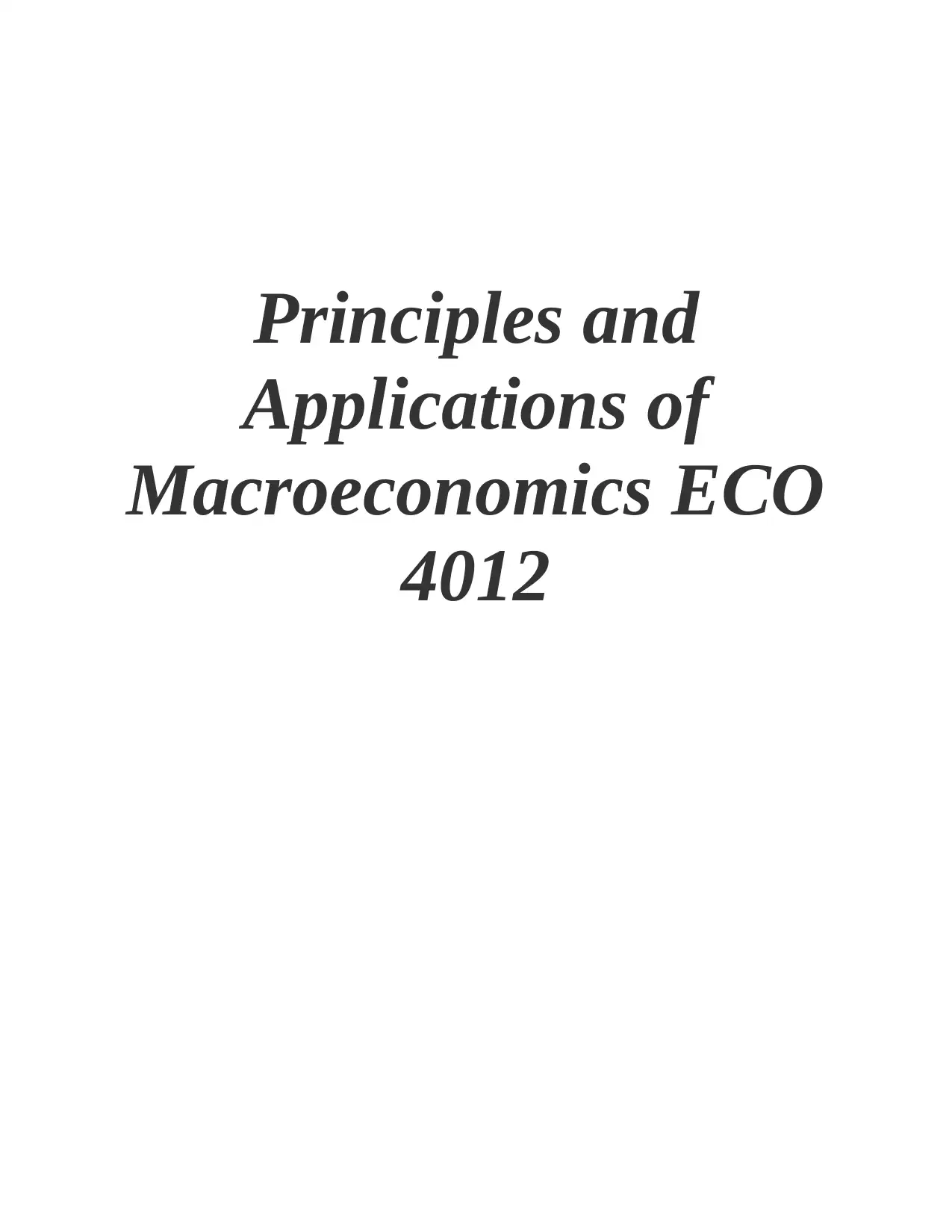
Principles and
Applications of
Macroeconomics ECO
4012
Applications of
Macroeconomics ECO
4012
Paraphrase This Document
Need a fresh take? Get an instant paraphrase of this document with our AI Paraphraser
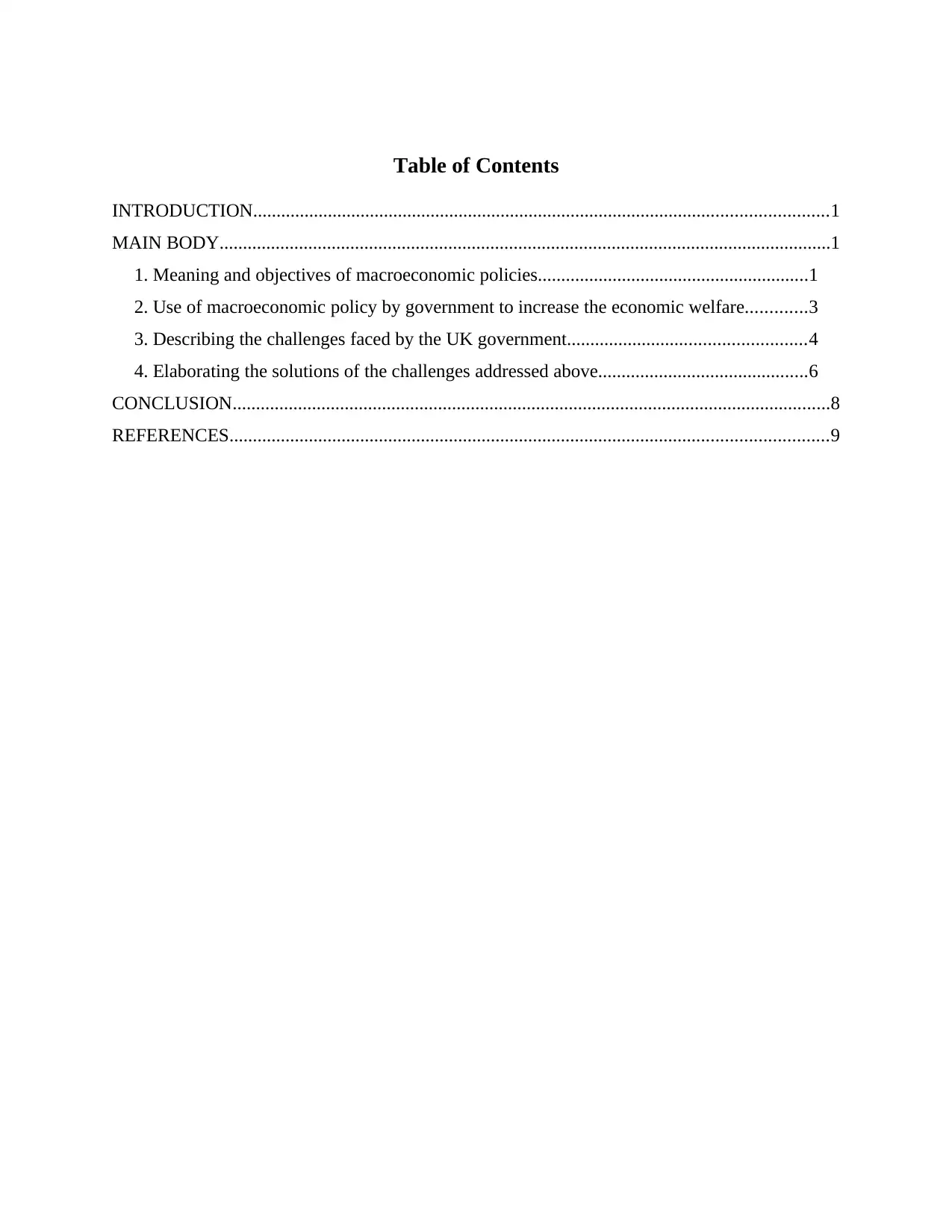
Table of Contents
INTRODUCTION...........................................................................................................................1
MAIN BODY...................................................................................................................................1
1. Meaning and objectives of macroeconomic policies..........................................................1
2. Use of macroeconomic policy by government to increase the economic welfare.............3
3. Describing the challenges faced by the UK government...................................................4
4. Elaborating the solutions of the challenges addressed above.............................................6
CONCLUSION................................................................................................................................8
REFERENCES................................................................................................................................9
INTRODUCTION...........................................................................................................................1
MAIN BODY...................................................................................................................................1
1. Meaning and objectives of macroeconomic policies..........................................................1
2. Use of macroeconomic policy by government to increase the economic welfare.............3
3. Describing the challenges faced by the UK government...................................................4
4. Elaborating the solutions of the challenges addressed above.............................................6
CONCLUSION................................................................................................................................8
REFERENCES................................................................................................................................9
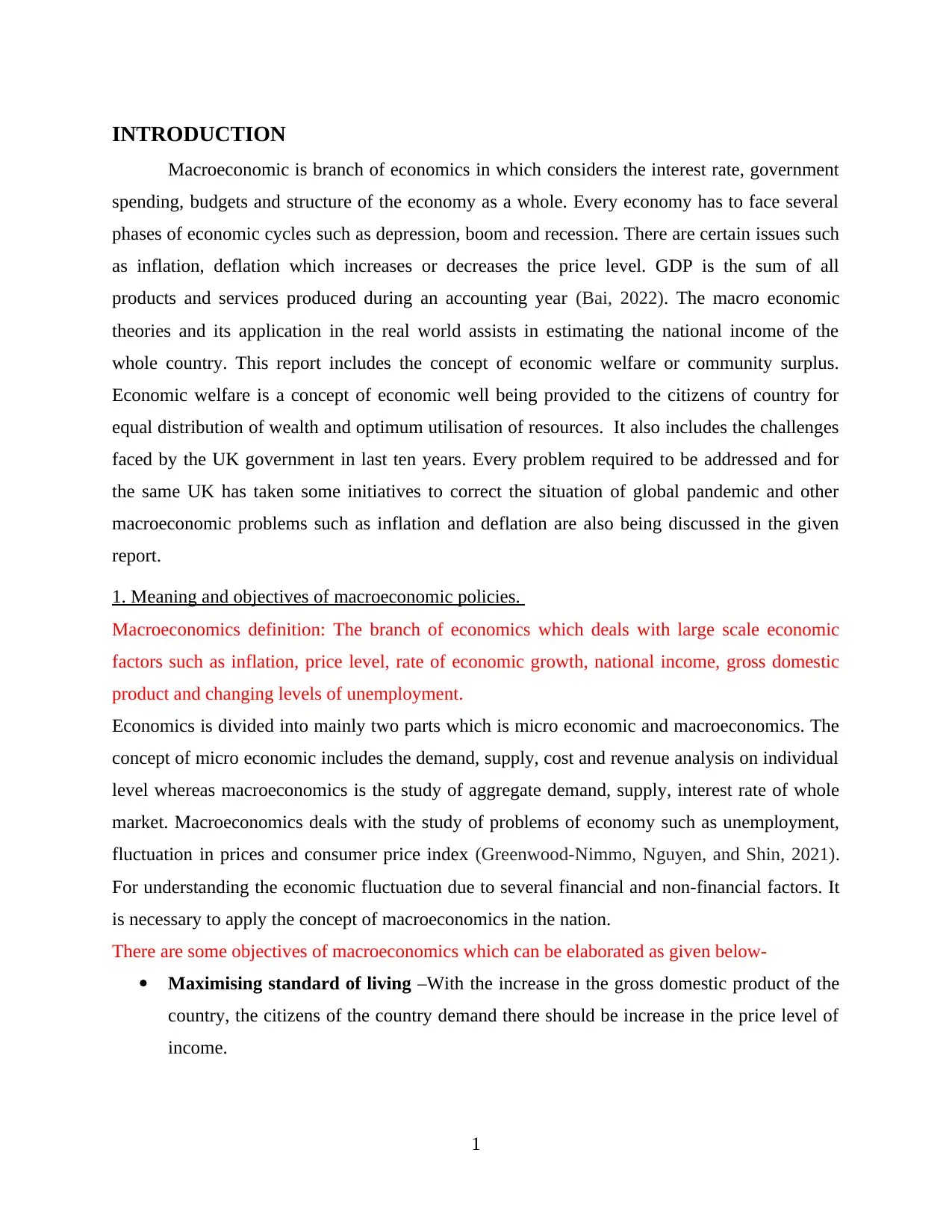
INTRODUCTION
Macroeconomic is branch of economics in which considers the interest rate, government
spending, budgets and structure of the economy as a whole. Every economy has to face several
phases of economic cycles such as depression, boom and recession. There are certain issues such
as inflation, deflation which increases or decreases the price level. GDP is the sum of all
products and services produced during an accounting year (Bai, 2022). The macro economic
theories and its application in the real world assists in estimating the national income of the
whole country. This report includes the concept of economic welfare or community surplus.
Economic welfare is a concept of economic well being provided to the citizens of country for
equal distribution of wealth and optimum utilisation of resources. It also includes the challenges
faced by the UK government in last ten years. Every problem required to be addressed and for
the same UK has taken some initiatives to correct the situation of global pandemic and other
macroeconomic problems such as inflation and deflation are also being discussed in the given
report.
1. Meaning and objectives of macroeconomic policies.
Macroeconomics definition: The branch of economics which deals with large scale economic
factors such as inflation, price level, rate of economic growth, national income, gross domestic
product and changing levels of unemployment.
Economics is divided into mainly two parts which is micro economic and macroeconomics. The
concept of micro economic includes the demand, supply, cost and revenue analysis on individual
level whereas macroeconomics is the study of aggregate demand, supply, interest rate of whole
market. Macroeconomics deals with the study of problems of economy such as unemployment,
fluctuation in prices and consumer price index (Greenwood-Nimmo, Nguyen, and Shin, 2021).
For understanding the economic fluctuation due to several financial and non-financial factors. It
is necessary to apply the concept of macroeconomics in the nation.
There are some objectives of macroeconomics which can be elaborated as given below-
Maximising standard of living –With the increase in the gross domestic product of the
country, the citizens of the country demand there should be increase in the price level of
income.
1
Macroeconomic is branch of economics in which considers the interest rate, government
spending, budgets and structure of the economy as a whole. Every economy has to face several
phases of economic cycles such as depression, boom and recession. There are certain issues such
as inflation, deflation which increases or decreases the price level. GDP is the sum of all
products and services produced during an accounting year (Bai, 2022). The macro economic
theories and its application in the real world assists in estimating the national income of the
whole country. This report includes the concept of economic welfare or community surplus.
Economic welfare is a concept of economic well being provided to the citizens of country for
equal distribution of wealth and optimum utilisation of resources. It also includes the challenges
faced by the UK government in last ten years. Every problem required to be addressed and for
the same UK has taken some initiatives to correct the situation of global pandemic and other
macroeconomic problems such as inflation and deflation are also being discussed in the given
report.
1. Meaning and objectives of macroeconomic policies.
Macroeconomics definition: The branch of economics which deals with large scale economic
factors such as inflation, price level, rate of economic growth, national income, gross domestic
product and changing levels of unemployment.
Economics is divided into mainly two parts which is micro economic and macroeconomics. The
concept of micro economic includes the demand, supply, cost and revenue analysis on individual
level whereas macroeconomics is the study of aggregate demand, supply, interest rate of whole
market. Macroeconomics deals with the study of problems of economy such as unemployment,
fluctuation in prices and consumer price index (Greenwood-Nimmo, Nguyen, and Shin, 2021).
For understanding the economic fluctuation due to several financial and non-financial factors. It
is necessary to apply the concept of macroeconomics in the nation.
There are some objectives of macroeconomics which can be elaborated as given below-
Maximising standard of living –With the increase in the gross domestic product of the
country, the citizens of the country demand there should be increase in the price level of
income.
1
⊘ This is a preview!⊘
Do you want full access?
Subscribe today to unlock all pages.

Trusted by 1+ million students worldwide
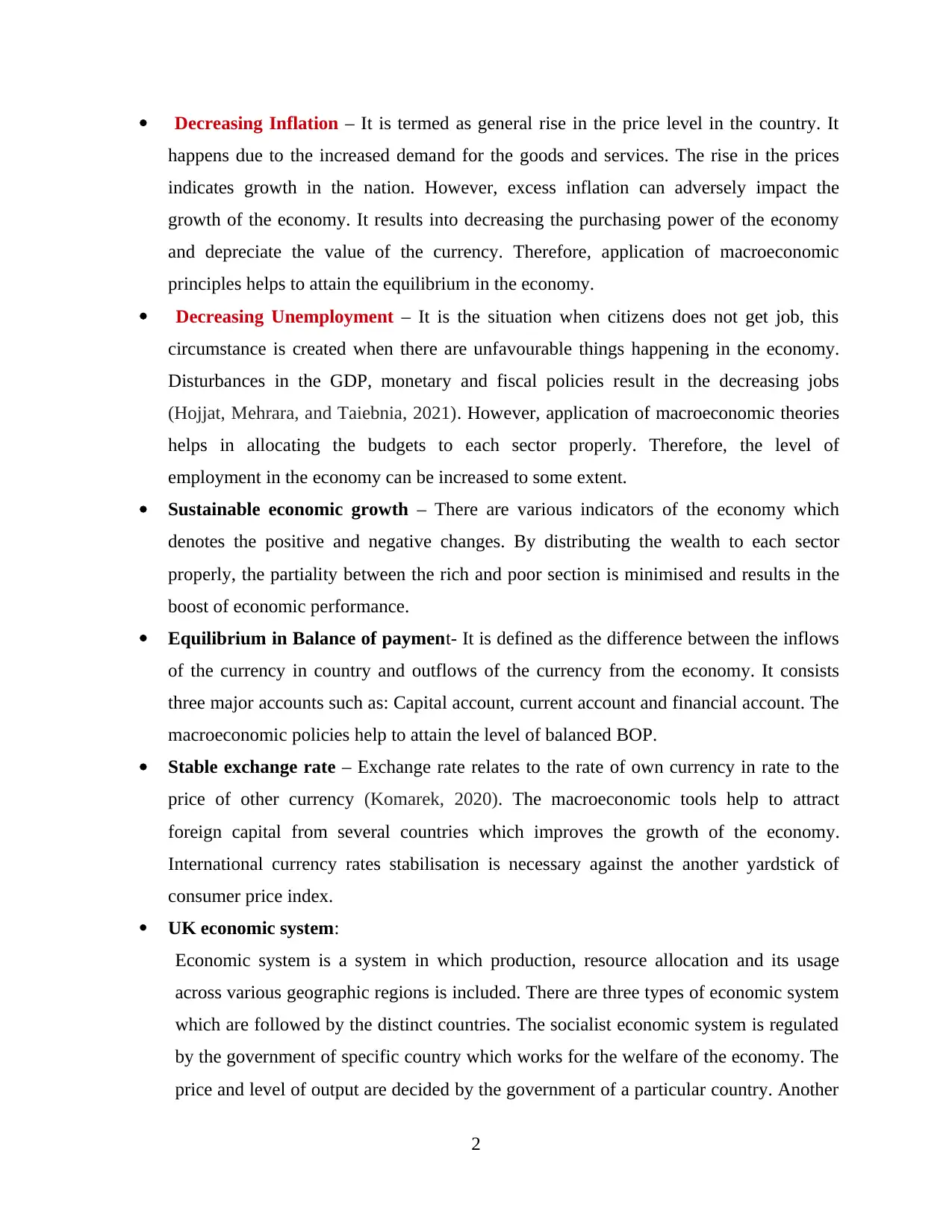
Decreasing Inflation – It is termed as general rise in the price level in the country. It
happens due to the increased demand for the goods and services. The rise in the prices
indicates growth in the nation. However, excess inflation can adversely impact the
growth of the economy. It results into decreasing the purchasing power of the economy
and depreciate the value of the currency. Therefore, application of macroeconomic
principles helps to attain the equilibrium in the economy.
Decreasing Unemployment – It is the situation when citizens does not get job, this
circumstance is created when there are unfavourable things happening in the economy.
Disturbances in the GDP, monetary and fiscal policies result in the decreasing jobs
(Hojjat, Mehrara, and Taiebnia, 2021). However, application of macroeconomic theories
helps in allocating the budgets to each sector properly. Therefore, the level of
employment in the economy can be increased to some extent.
Sustainable economic growth – There are various indicators of the economy which
denotes the positive and negative changes. By distributing the wealth to each sector
properly, the partiality between the rich and poor section is minimised and results in the
boost of economic performance.
Equilibrium in Balance of payment- It is defined as the difference between the inflows
of the currency in country and outflows of the currency from the economy. It consists
three major accounts such as: Capital account, current account and financial account. The
macroeconomic policies help to attain the level of balanced BOP.
Stable exchange rate – Exchange rate relates to the rate of own currency in rate to the
price of other currency (Komarek, 2020). The macroeconomic tools help to attract
foreign capital from several countries which improves the growth of the economy.
International currency rates stabilisation is necessary against the another yardstick of
consumer price index.
UK economic system:
Economic system is a system in which production, resource allocation and its usage
across various geographic regions is included. There are three types of economic system
which are followed by the distinct countries. The socialist economic system is regulated
by the government of specific country which works for the welfare of the economy. The
price and level of output are decided by the government of a particular country. Another
2
happens due to the increased demand for the goods and services. The rise in the prices
indicates growth in the nation. However, excess inflation can adversely impact the
growth of the economy. It results into decreasing the purchasing power of the economy
and depreciate the value of the currency. Therefore, application of macroeconomic
principles helps to attain the equilibrium in the economy.
Decreasing Unemployment – It is the situation when citizens does not get job, this
circumstance is created when there are unfavourable things happening in the economy.
Disturbances in the GDP, monetary and fiscal policies result in the decreasing jobs
(Hojjat, Mehrara, and Taiebnia, 2021). However, application of macroeconomic theories
helps in allocating the budgets to each sector properly. Therefore, the level of
employment in the economy can be increased to some extent.
Sustainable economic growth – There are various indicators of the economy which
denotes the positive and negative changes. By distributing the wealth to each sector
properly, the partiality between the rich and poor section is minimised and results in the
boost of economic performance.
Equilibrium in Balance of payment- It is defined as the difference between the inflows
of the currency in country and outflows of the currency from the economy. It consists
three major accounts such as: Capital account, current account and financial account. The
macroeconomic policies help to attain the level of balanced BOP.
Stable exchange rate – Exchange rate relates to the rate of own currency in rate to the
price of other currency (Komarek, 2020). The macroeconomic tools help to attract
foreign capital from several countries which improves the growth of the economy.
International currency rates stabilisation is necessary against the another yardstick of
consumer price index.
UK economic system:
Economic system is a system in which production, resource allocation and its usage
across various geographic regions is included. There are three types of economic system
which are followed by the distinct countries. The socialist economic system is regulated
by the government of specific country which works for the welfare of the economy. The
price and level of output are decided by the government of a particular country. Another
2
Paraphrase This Document
Need a fresh take? Get an instant paraphrase of this document with our AI Paraphraser
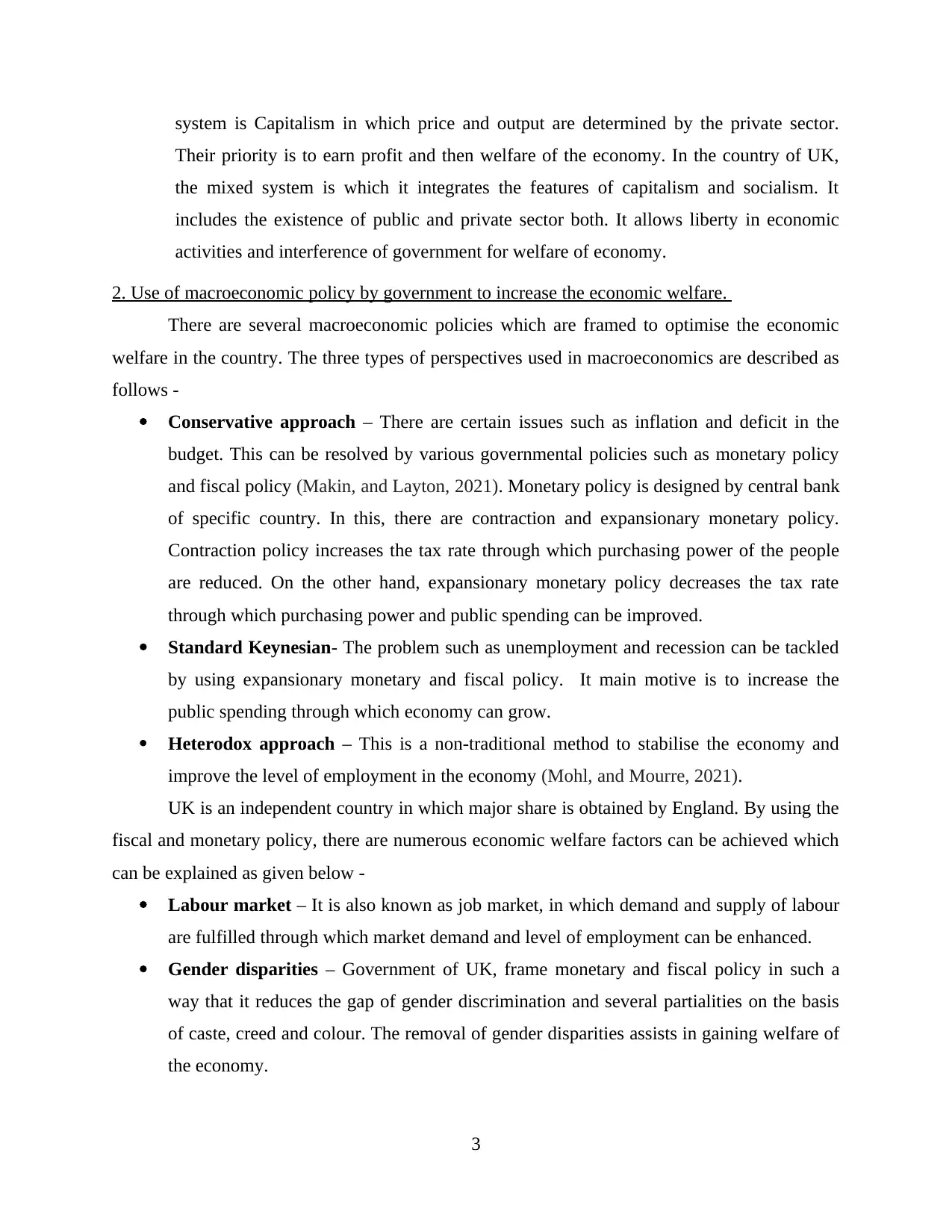
system is Capitalism in which price and output are determined by the private sector.
Their priority is to earn profit and then welfare of the economy. In the country of UK,
the mixed system is which it integrates the features of capitalism and socialism. It
includes the existence of public and private sector both. It allows liberty in economic
activities and interference of government for welfare of economy.
2. Use of macroeconomic policy by government to increase the economic welfare.
There are several macroeconomic policies which are framed to optimise the economic
welfare in the country. The three types of perspectives used in macroeconomics are described as
follows -
Conservative approach – There are certain issues such as inflation and deficit in the
budget. This can be resolved by various governmental policies such as monetary policy
and fiscal policy (Makin, and Layton, 2021). Monetary policy is designed by central bank
of specific country. In this, there are contraction and expansionary monetary policy.
Contraction policy increases the tax rate through which purchasing power of the people
are reduced. On the other hand, expansionary monetary policy decreases the tax rate
through which purchasing power and public spending can be improved.
Standard Keynesian- The problem such as unemployment and recession can be tackled
by using expansionary monetary and fiscal policy. It main motive is to increase the
public spending through which economy can grow.
Heterodox approach – This is a non-traditional method to stabilise the economy and
improve the level of employment in the economy (Mohl, and Mourre, 2021).
UK is an independent country in which major share is obtained by England. By using the
fiscal and monetary policy, there are numerous economic welfare factors can be achieved which
can be explained as given below -
Labour market – It is also known as job market, in which demand and supply of labour
are fulfilled through which market demand and level of employment can be enhanced.
Gender disparities – Government of UK, frame monetary and fiscal policy in such a
way that it reduces the gap of gender discrimination and several partialities on the basis
of caste, creed and colour. The removal of gender disparities assists in gaining welfare of
the economy.
3
Their priority is to earn profit and then welfare of the economy. In the country of UK,
the mixed system is which it integrates the features of capitalism and socialism. It
includes the existence of public and private sector both. It allows liberty in economic
activities and interference of government for welfare of economy.
2. Use of macroeconomic policy by government to increase the economic welfare.
There are several macroeconomic policies which are framed to optimise the economic
welfare in the country. The three types of perspectives used in macroeconomics are described as
follows -
Conservative approach – There are certain issues such as inflation and deficit in the
budget. This can be resolved by various governmental policies such as monetary policy
and fiscal policy (Makin, and Layton, 2021). Monetary policy is designed by central bank
of specific country. In this, there are contraction and expansionary monetary policy.
Contraction policy increases the tax rate through which purchasing power of the people
are reduced. On the other hand, expansionary monetary policy decreases the tax rate
through which purchasing power and public spending can be improved.
Standard Keynesian- The problem such as unemployment and recession can be tackled
by using expansionary monetary and fiscal policy. It main motive is to increase the
public spending through which economy can grow.
Heterodox approach – This is a non-traditional method to stabilise the economy and
improve the level of employment in the economy (Mohl, and Mourre, 2021).
UK is an independent country in which major share is obtained by England. By using the
fiscal and monetary policy, there are numerous economic welfare factors can be achieved which
can be explained as given below -
Labour market – It is also known as job market, in which demand and supply of labour
are fulfilled through which market demand and level of employment can be enhanced.
Gender disparities – Government of UK, frame monetary and fiscal policy in such a
way that it reduces the gap of gender discrimination and several partialities on the basis
of caste, creed and colour. The removal of gender disparities assists in gaining welfare of
the economy.
3
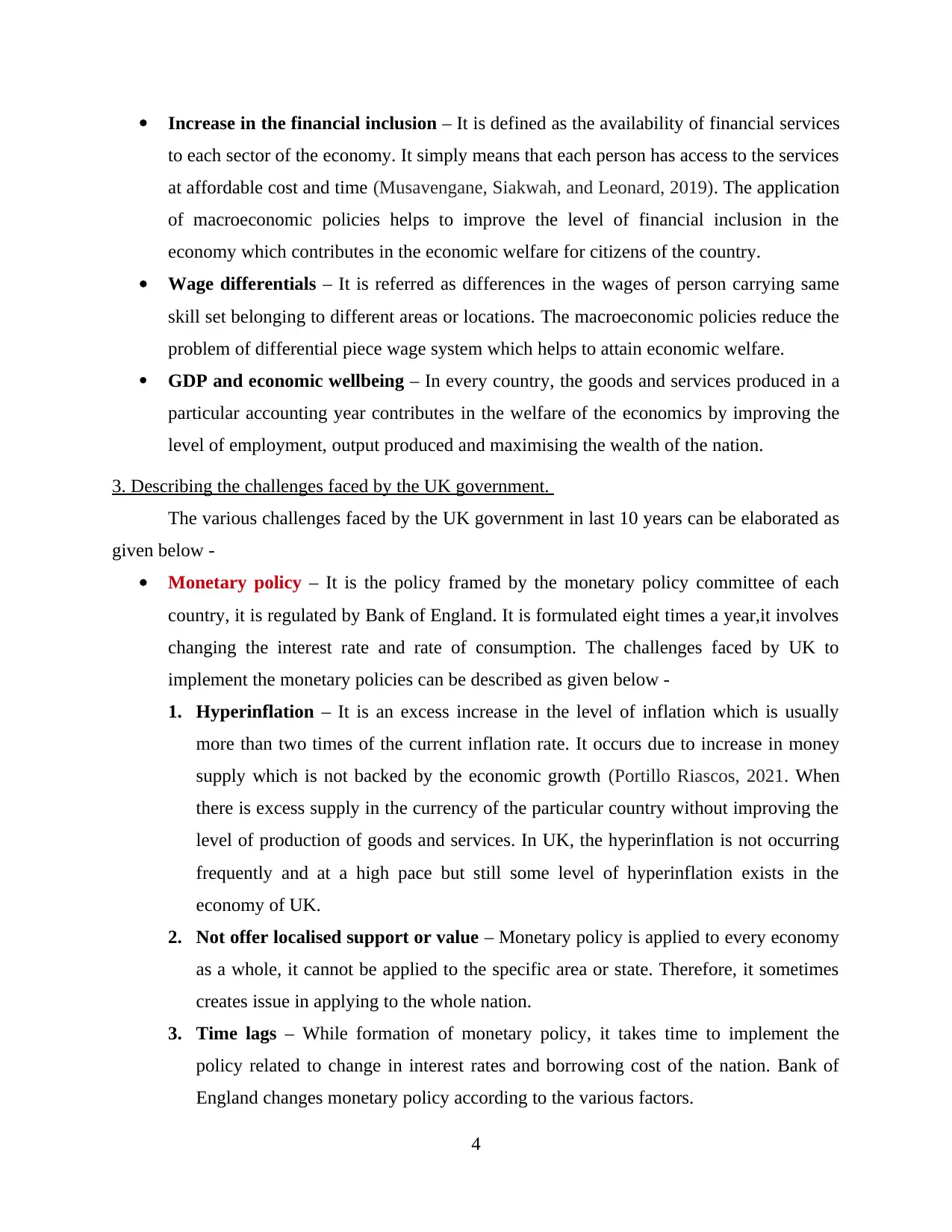
Increase in the financial inclusion – It is defined as the availability of financial services
to each sector of the economy. It simply means that each person has access to the services
at affordable cost and time (Musavengane, Siakwah, and Leonard, 2019). The application
of macroeconomic policies helps to improve the level of financial inclusion in the
economy which contributes in the economic welfare for citizens of the country.
Wage differentials – It is referred as differences in the wages of person carrying same
skill set belonging to different areas or locations. The macroeconomic policies reduce the
problem of differential piece wage system which helps to attain economic welfare.
GDP and economic wellbeing – In every country, the goods and services produced in a
particular accounting year contributes in the welfare of the economics by improving the
level of employment, output produced and maximising the wealth of the nation.
3. Describing the challenges faced by the UK government.
The various challenges faced by the UK government in last 10 years can be elaborated as
given below -
Monetary policy – It is the policy framed by the monetary policy committee of each
country, it is regulated by Bank of England. It is formulated eight times a year,it involves
changing the interest rate and rate of consumption. The challenges faced by UK to
implement the monetary policies can be described as given below -
1. Hyperinflation – It is an excess increase in the level of inflation which is usually
more than two times of the current inflation rate. It occurs due to increase in money
supply which is not backed by the economic growth (Portillo Riascos, 2021. When
there is excess supply in the currency of the particular country without improving the
level of production of goods and services. In UK, the hyperinflation is not occurring
frequently and at a high pace but still some level of hyperinflation exists in the
economy of UK.
2. Not offer localised support or value – Monetary policy is applied to every economy
as a whole, it cannot be applied to the specific area or state. Therefore, it sometimes
creates issue in applying to the whole nation.
3. Time lags – While formation of monetary policy, it takes time to implement the
policy related to change in interest rates and borrowing cost of the nation. Bank of
England changes monetary policy according to the various factors.
4
to each sector of the economy. It simply means that each person has access to the services
at affordable cost and time (Musavengane, Siakwah, and Leonard, 2019). The application
of macroeconomic policies helps to improve the level of financial inclusion in the
economy which contributes in the economic welfare for citizens of the country.
Wage differentials – It is referred as differences in the wages of person carrying same
skill set belonging to different areas or locations. The macroeconomic policies reduce the
problem of differential piece wage system which helps to attain economic welfare.
GDP and economic wellbeing – In every country, the goods and services produced in a
particular accounting year contributes in the welfare of the economics by improving the
level of employment, output produced and maximising the wealth of the nation.
3. Describing the challenges faced by the UK government.
The various challenges faced by the UK government in last 10 years can be elaborated as
given below -
Monetary policy – It is the policy framed by the monetary policy committee of each
country, it is regulated by Bank of England. It is formulated eight times a year,it involves
changing the interest rate and rate of consumption. The challenges faced by UK to
implement the monetary policies can be described as given below -
1. Hyperinflation – It is an excess increase in the level of inflation which is usually
more than two times of the current inflation rate. It occurs due to increase in money
supply which is not backed by the economic growth (Portillo Riascos, 2021. When
there is excess supply in the currency of the particular country without improving the
level of production of goods and services. In UK, the hyperinflation is not occurring
frequently and at a high pace but still some level of hyperinflation exists in the
economy of UK.
2. Not offer localised support or value – Monetary policy is applied to every economy
as a whole, it cannot be applied to the specific area or state. Therefore, it sometimes
creates issue in applying to the whole nation.
3. Time lags – While formation of monetary policy, it takes time to implement the
policy related to change in interest rates and borrowing cost of the nation. Bank of
England changes monetary policy according to the various factors.
4
⊘ This is a preview!⊘
Do you want full access?
Subscribe today to unlock all pages.

Trusted by 1+ million students worldwide
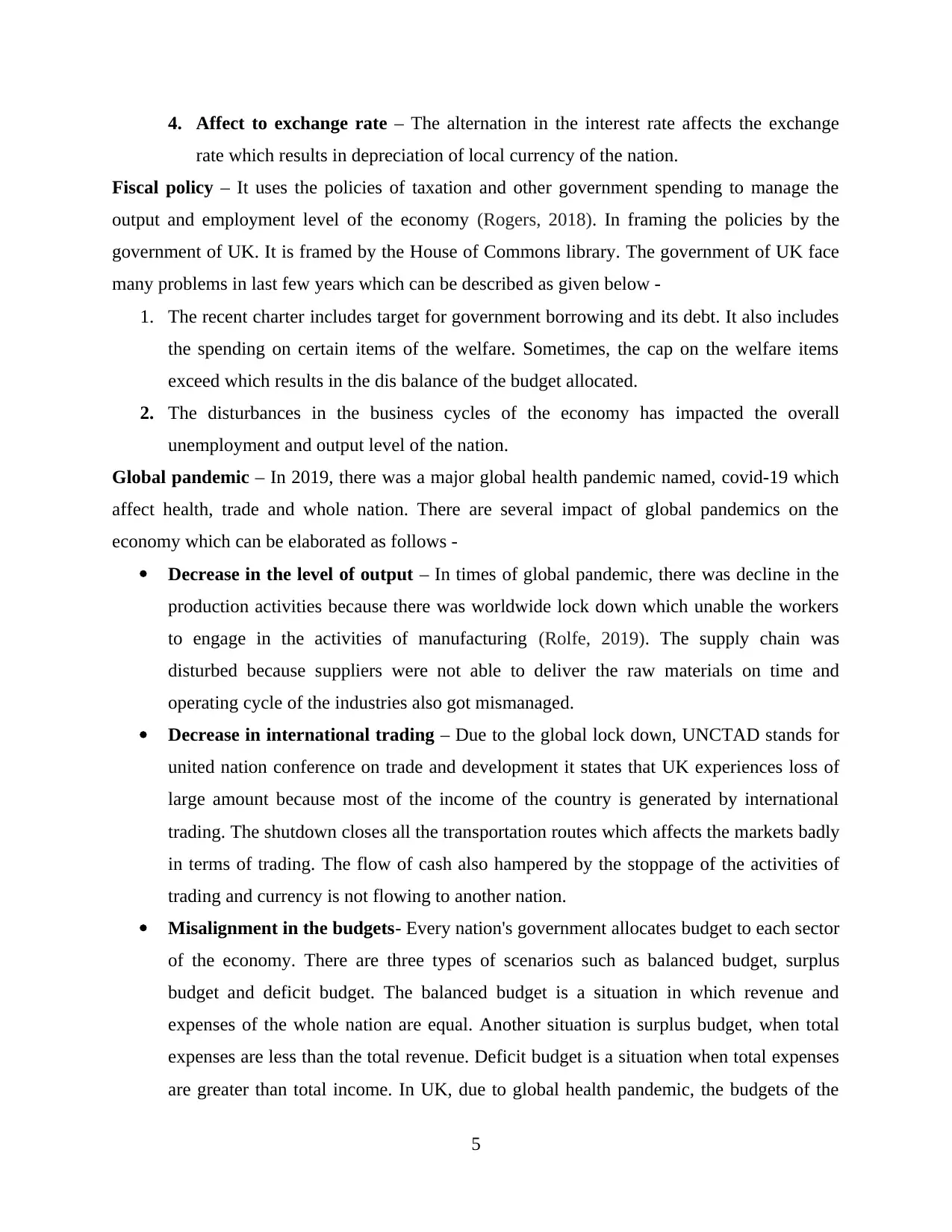
4. Affect to exchange rate – The alternation in the interest rate affects the exchange
rate which results in depreciation of local currency of the nation.
Fiscal policy – It uses the policies of taxation and other government spending to manage the
output and employment level of the economy (Rogers, 2018). In framing the policies by the
government of UK. It is framed by the House of Commons library. The government of UK face
many problems in last few years which can be described as given below -
1. The recent charter includes target for government borrowing and its debt. It also includes
the spending on certain items of the welfare. Sometimes, the cap on the welfare items
exceed which results in the dis balance of the budget allocated.
2. The disturbances in the business cycles of the economy has impacted the overall
unemployment and output level of the nation.
Global pandemic – In 2019, there was a major global health pandemic named, covid-19 which
affect health, trade and whole nation. There are several impact of global pandemics on the
economy which can be elaborated as follows -
Decrease in the level of output – In times of global pandemic, there was decline in the
production activities because there was worldwide lock down which unable the workers
to engage in the activities of manufacturing (Rolfe, 2019). The supply chain was
disturbed because suppliers were not able to deliver the raw materials on time and
operating cycle of the industries also got mismanaged.
Decrease in international trading – Due to the global lock down, UNCTAD stands for
united nation conference on trade and development it states that UK experiences loss of
large amount because most of the income of the country is generated by international
trading. The shutdown closes all the transportation routes which affects the markets badly
in terms of trading. The flow of cash also hampered by the stoppage of the activities of
trading and currency is not flowing to another nation.
Misalignment in the budgets- Every nation's government allocates budget to each sector
of the economy. There are three types of scenarios such as balanced budget, surplus
budget and deficit budget. The balanced budget is a situation in which revenue and
expenses of the whole nation are equal. Another situation is surplus budget, when total
expenses are less than the total revenue. Deficit budget is a situation when total expenses
are greater than total income. In UK, due to global health pandemic, the budgets of the
5
rate which results in depreciation of local currency of the nation.
Fiscal policy – It uses the policies of taxation and other government spending to manage the
output and employment level of the economy (Rogers, 2018). In framing the policies by the
government of UK. It is framed by the House of Commons library. The government of UK face
many problems in last few years which can be described as given below -
1. The recent charter includes target for government borrowing and its debt. It also includes
the spending on certain items of the welfare. Sometimes, the cap on the welfare items
exceed which results in the dis balance of the budget allocated.
2. The disturbances in the business cycles of the economy has impacted the overall
unemployment and output level of the nation.
Global pandemic – In 2019, there was a major global health pandemic named, covid-19 which
affect health, trade and whole nation. There are several impact of global pandemics on the
economy which can be elaborated as follows -
Decrease in the level of output – In times of global pandemic, there was decline in the
production activities because there was worldwide lock down which unable the workers
to engage in the activities of manufacturing (Rolfe, 2019). The supply chain was
disturbed because suppliers were not able to deliver the raw materials on time and
operating cycle of the industries also got mismanaged.
Decrease in international trading – Due to the global lock down, UNCTAD stands for
united nation conference on trade and development it states that UK experiences loss of
large amount because most of the income of the country is generated by international
trading. The shutdown closes all the transportation routes which affects the markets badly
in terms of trading. The flow of cash also hampered by the stoppage of the activities of
trading and currency is not flowing to another nation.
Misalignment in the budgets- Every nation's government allocates budget to each sector
of the economy. There are three types of scenarios such as balanced budget, surplus
budget and deficit budget. The balanced budget is a situation in which revenue and
expenses of the whole nation are equal. Another situation is surplus budget, when total
expenses are less than the total revenue. Deficit budget is a situation when total expenses
are greater than total income. In UK, due to global health pandemic, the budgets of the
5
Paraphrase This Document
Need a fresh take? Get an instant paraphrase of this document with our AI Paraphraser
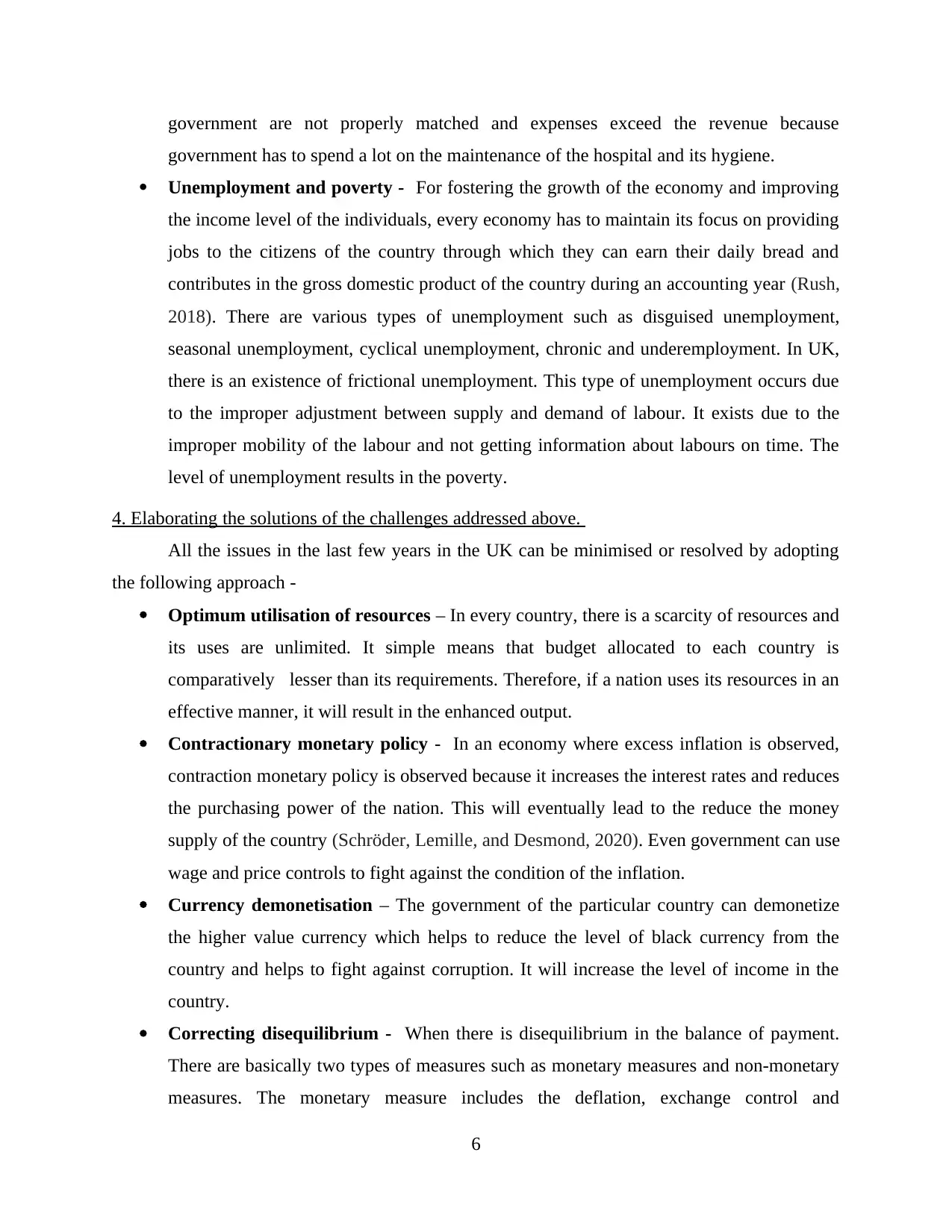
government are not properly matched and expenses exceed the revenue because
government has to spend a lot on the maintenance of the hospital and its hygiene.
Unemployment and poverty - For fostering the growth of the economy and improving
the income level of the individuals, every economy has to maintain its focus on providing
jobs to the citizens of the country through which they can earn their daily bread and
contributes in the gross domestic product of the country during an accounting year (Rush,
2018). There are various types of unemployment such as disguised unemployment,
seasonal unemployment, cyclical unemployment, chronic and underemployment. In UK,
there is an existence of frictional unemployment. This type of unemployment occurs due
to the improper adjustment between supply and demand of labour. It exists due to the
improper mobility of the labour and not getting information about labours on time. The
level of unemployment results in the poverty.
4. Elaborating the solutions of the challenges addressed above.
All the issues in the last few years in the UK can be minimised or resolved by adopting
the following approach -
Optimum utilisation of resources – In every country, there is a scarcity of resources and
its uses are unlimited. It simple means that budget allocated to each country is
comparatively lesser than its requirements. Therefore, if a nation uses its resources in an
effective manner, it will result in the enhanced output.
Contractionary monetary policy - In an economy where excess inflation is observed,
contraction monetary policy is observed because it increases the interest rates and reduces
the purchasing power of the nation. This will eventually lead to the reduce the money
supply of the country (Schröder, Lemille, and Desmond, 2020). Even government can use
wage and price controls to fight against the condition of the inflation.
Currency demonetisation – The government of the particular country can demonetize
the higher value currency which helps to reduce the level of black currency from the
country and helps to fight against corruption. It will increase the level of income in the
country.
Correcting disequilibrium - When there is disequilibrium in the balance of payment.
There are basically two types of measures such as monetary measures and non-monetary
measures. The monetary measure includes the deflation, exchange control and
6
government has to spend a lot on the maintenance of the hospital and its hygiene.
Unemployment and poverty - For fostering the growth of the economy and improving
the income level of the individuals, every economy has to maintain its focus on providing
jobs to the citizens of the country through which they can earn their daily bread and
contributes in the gross domestic product of the country during an accounting year (Rush,
2018). There are various types of unemployment such as disguised unemployment,
seasonal unemployment, cyclical unemployment, chronic and underemployment. In UK,
there is an existence of frictional unemployment. This type of unemployment occurs due
to the improper adjustment between supply and demand of labour. It exists due to the
improper mobility of the labour and not getting information about labours on time. The
level of unemployment results in the poverty.
4. Elaborating the solutions of the challenges addressed above.
All the issues in the last few years in the UK can be minimised or resolved by adopting
the following approach -
Optimum utilisation of resources – In every country, there is a scarcity of resources and
its uses are unlimited. It simple means that budget allocated to each country is
comparatively lesser than its requirements. Therefore, if a nation uses its resources in an
effective manner, it will result in the enhanced output.
Contractionary monetary policy - In an economy where excess inflation is observed,
contraction monetary policy is observed because it increases the interest rates and reduces
the purchasing power of the nation. This will eventually lead to the reduce the money
supply of the country (Schröder, Lemille, and Desmond, 2020). Even government can use
wage and price controls to fight against the condition of the inflation.
Currency demonetisation – The government of the particular country can demonetize
the higher value currency which helps to reduce the level of black currency from the
country and helps to fight against corruption. It will increase the level of income in the
country.
Correcting disequilibrium - When there is disequilibrium in the balance of payment.
There are basically two types of measures such as monetary measures and non-monetary
measures. The monetary measure includes the deflation, exchange control and
6
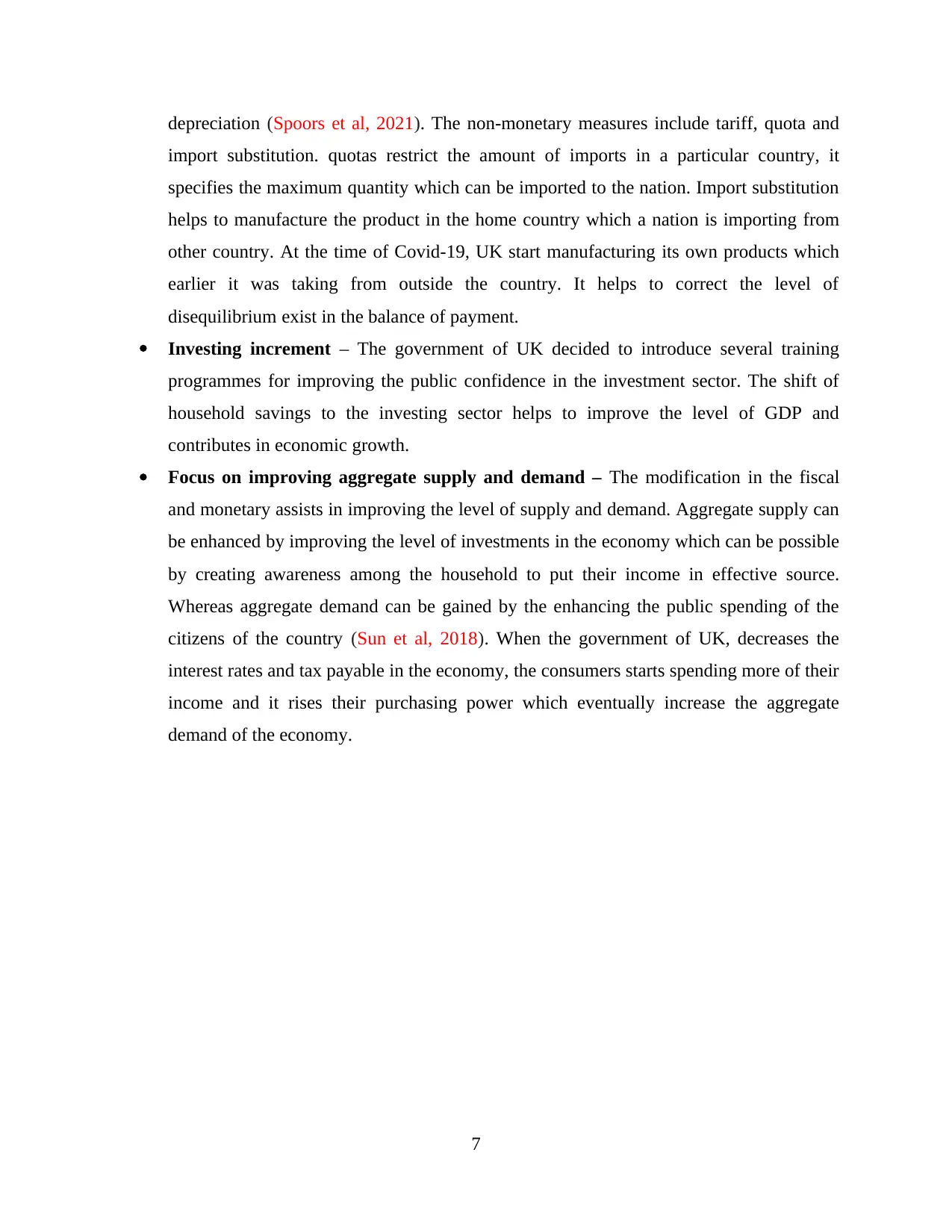
depreciation (Spoors et al, 2021). The non-monetary measures include tariff, quota and
import substitution. quotas restrict the amount of imports in a particular country, it
specifies the maximum quantity which can be imported to the nation. Import substitution
helps to manufacture the product in the home country which a nation is importing from
other country. At the time of Covid-19, UK start manufacturing its own products which
earlier it was taking from outside the country. It helps to correct the level of
disequilibrium exist in the balance of payment.
Investing increment – The government of UK decided to introduce several training
programmes for improving the public confidence in the investment sector. The shift of
household savings to the investing sector helps to improve the level of GDP and
contributes in economic growth.
Focus on improving aggregate supply and demand – The modification in the fiscal
and monetary assists in improving the level of supply and demand. Aggregate supply can
be enhanced by improving the level of investments in the economy which can be possible
by creating awareness among the household to put their income in effective source.
Whereas aggregate demand can be gained by the enhancing the public spending of the
citizens of the country (Sun et al, 2018). When the government of UK, decreases the
interest rates and tax payable in the economy, the consumers starts spending more of their
income and it rises their purchasing power which eventually increase the aggregate
demand of the economy.
7
import substitution. quotas restrict the amount of imports in a particular country, it
specifies the maximum quantity which can be imported to the nation. Import substitution
helps to manufacture the product in the home country which a nation is importing from
other country. At the time of Covid-19, UK start manufacturing its own products which
earlier it was taking from outside the country. It helps to correct the level of
disequilibrium exist in the balance of payment.
Investing increment – The government of UK decided to introduce several training
programmes for improving the public confidence in the investment sector. The shift of
household savings to the investing sector helps to improve the level of GDP and
contributes in economic growth.
Focus on improving aggregate supply and demand – The modification in the fiscal
and monetary assists in improving the level of supply and demand. Aggregate supply can
be enhanced by improving the level of investments in the economy which can be possible
by creating awareness among the household to put their income in effective source.
Whereas aggregate demand can be gained by the enhancing the public spending of the
citizens of the country (Sun et al, 2018). When the government of UK, decreases the
interest rates and tax payable in the economy, the consumers starts spending more of their
income and it rises their purchasing power which eventually increase the aggregate
demand of the economy.
7
⊘ This is a preview!⊘
Do you want full access?
Subscribe today to unlock all pages.

Trusted by 1+ million students worldwide
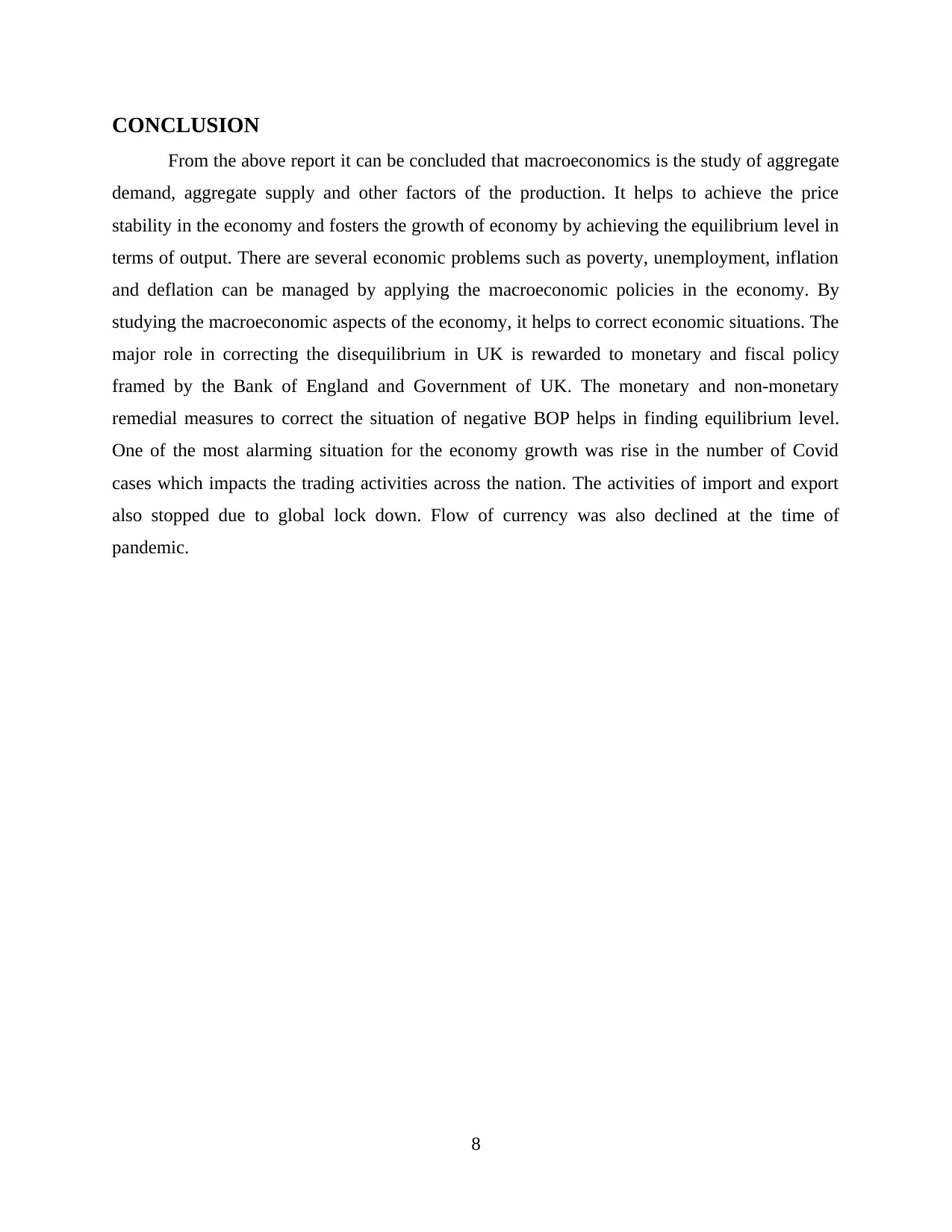
CONCLUSION
From the above report it can be concluded that macroeconomics is the study of aggregate
demand, aggregate supply and other factors of the production. It helps to achieve the price
stability in the economy and fosters the growth of economy by achieving the equilibrium level in
terms of output. There are several economic problems such as poverty, unemployment, inflation
and deflation can be managed by applying the macroeconomic policies in the economy. By
studying the macroeconomic aspects of the economy, it helps to correct economic situations. The
major role in correcting the disequilibrium in UK is rewarded to monetary and fiscal policy
framed by the Bank of England and Government of UK. The monetary and non-monetary
remedial measures to correct the situation of negative BOP helps in finding equilibrium level.
One of the most alarming situation for the economy growth was rise in the number of Covid
cases which impacts the trading activities across the nation. The activities of import and export
also stopped due to global lock down. Flow of currency was also declined at the time of
pandemic.
8
From the above report it can be concluded that macroeconomics is the study of aggregate
demand, aggregate supply and other factors of the production. It helps to achieve the price
stability in the economy and fosters the growth of economy by achieving the equilibrium level in
terms of output. There are several economic problems such as poverty, unemployment, inflation
and deflation can be managed by applying the macroeconomic policies in the economy. By
studying the macroeconomic aspects of the economy, it helps to correct economic situations. The
major role in correcting the disequilibrium in UK is rewarded to monetary and fiscal policy
framed by the Bank of England and Government of UK. The monetary and non-monetary
remedial measures to correct the situation of negative BOP helps in finding equilibrium level.
One of the most alarming situation for the economy growth was rise in the number of Covid
cases which impacts the trading activities across the nation. The activities of import and export
also stopped due to global lock down. Flow of currency was also declined at the time of
pandemic.
8
Paraphrase This Document
Need a fresh take? Get an instant paraphrase of this document with our AI Paraphraser
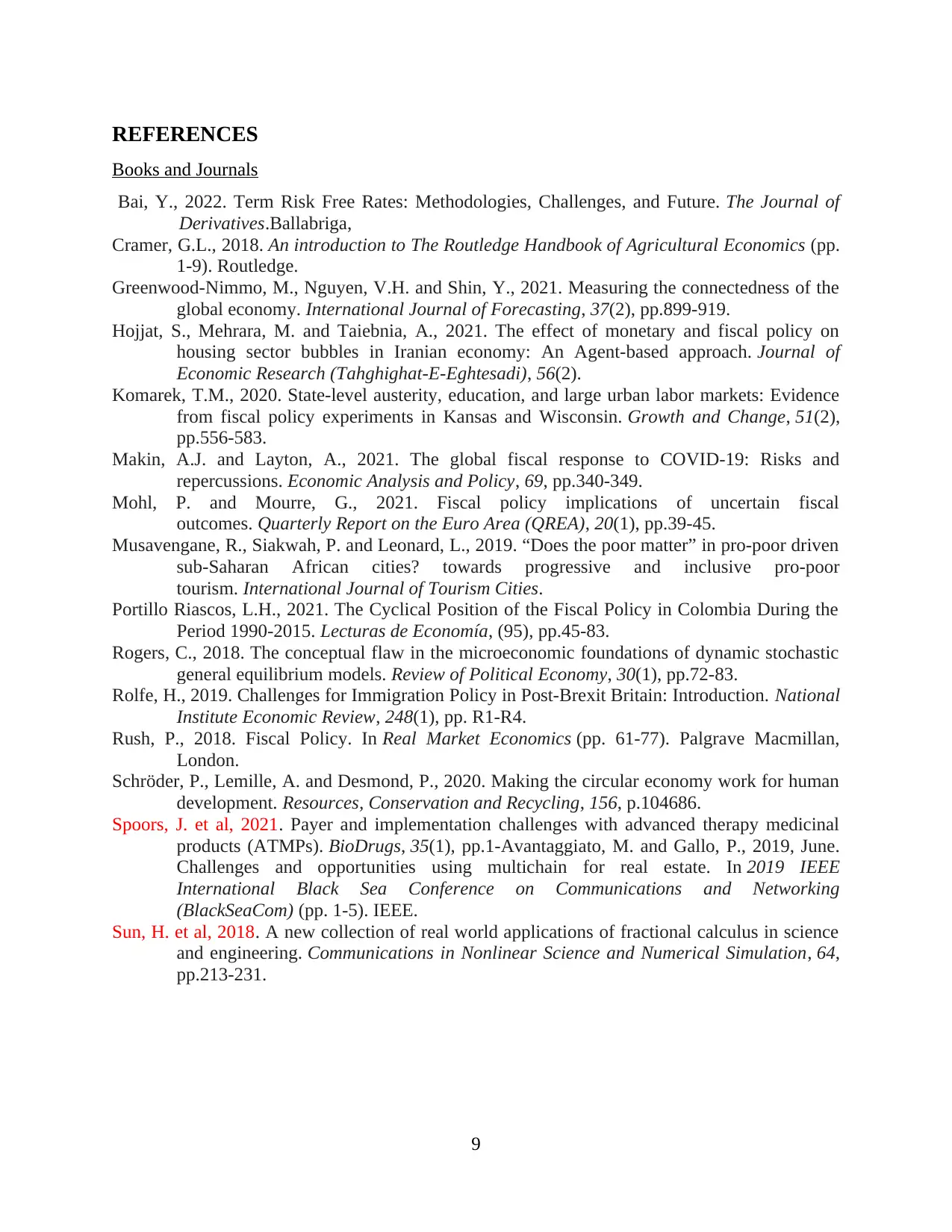
REFERENCES
Books and Journals
Bai, Y., 2022. Term Risk Free Rates: Methodologies, Challenges, and Future. The Journal of
Derivatives.Ballabriga,
Cramer, G.L., 2018. An introduction to The Routledge Handbook of Agricultural Economics (pp.
1-9). Routledge.
Greenwood-Nimmo, M., Nguyen, V.H. and Shin, Y., 2021. Measuring the connectedness of the
global economy. International Journal of Forecasting, 37(2), pp.899-919.
Hojjat, S., Mehrara, M. and Taiebnia, A., 2021. The effect of monetary and fiscal policy on
housing sector bubbles in Iranian economy: An Agent-based approach. Journal of
Economic Research (Tahghighat-E-Eghtesadi), 56(2).
Komarek, T.M., 2020. State‐level austerity, education, and large urban labor markets: Evidence
from fiscal policy experiments in Kansas and Wisconsin. Growth and Change, 51(2),
pp.556-583.
Makin, A.J. and Layton, A., 2021. The global fiscal response to COVID-19: Risks and
repercussions. Economic Analysis and Policy, 69, pp.340-349.
Mohl, P. and Mourre, G., 2021. Fiscal policy implications of uncertain fiscal
outcomes. Quarterly Report on the Euro Area (QREA), 20(1), pp.39-45.
Musavengane, R., Siakwah, P. and Leonard, L., 2019. “Does the poor matter” in pro-poor driven
sub-Saharan African cities? towards progressive and inclusive pro-poor
tourism. International Journal of Tourism Cities.
Portillo Riascos, L.H., 2021. The Cyclical Position of the Fiscal Policy in Colombia During the
Period 1990-2015. Lecturas de Economía, (95), pp.45-83.
Rogers, C., 2018. The conceptual flaw in the microeconomic foundations of dynamic stochastic
general equilibrium models. Review of Political Economy, 30(1), pp.72-83.
Rolfe, H., 2019. Challenges for Immigration Policy in Post-Brexit Britain: Introduction. National
Institute Economic Review, 248(1), pp. R1-R4.
Rush, P., 2018. Fiscal Policy. In Real Market Economics (pp. 61-77). Palgrave Macmillan,
London.
Schröder, P., Lemille, A. and Desmond, P., 2020. Making the circular economy work for human
development. Resources, Conservation and Recycling, 156, p.104686.
Spoors, J. et al, 2021. Payer and implementation challenges with advanced therapy medicinal
products (ATMPs). BioDrugs, 35(1), pp.1-Avantaggiato, M. and Gallo, P., 2019, June.
Challenges and opportunities using multichain for real estate. In 2019 IEEE
International Black Sea Conference on Communications and Networking
(BlackSeaCom) (pp. 1-5). IEEE.
Sun, H. et al, 2018. A new collection of real world applications of fractional calculus in science
and engineering. Communications in Nonlinear Science and Numerical Simulation, 64,
pp.213-231.
9
Books and Journals
Bai, Y., 2022. Term Risk Free Rates: Methodologies, Challenges, and Future. The Journal of
Derivatives.Ballabriga,
Cramer, G.L., 2018. An introduction to The Routledge Handbook of Agricultural Economics (pp.
1-9). Routledge.
Greenwood-Nimmo, M., Nguyen, V.H. and Shin, Y., 2021. Measuring the connectedness of the
global economy. International Journal of Forecasting, 37(2), pp.899-919.
Hojjat, S., Mehrara, M. and Taiebnia, A., 2021. The effect of monetary and fiscal policy on
housing sector bubbles in Iranian economy: An Agent-based approach. Journal of
Economic Research (Tahghighat-E-Eghtesadi), 56(2).
Komarek, T.M., 2020. State‐level austerity, education, and large urban labor markets: Evidence
from fiscal policy experiments in Kansas and Wisconsin. Growth and Change, 51(2),
pp.556-583.
Makin, A.J. and Layton, A., 2021. The global fiscal response to COVID-19: Risks and
repercussions. Economic Analysis and Policy, 69, pp.340-349.
Mohl, P. and Mourre, G., 2021. Fiscal policy implications of uncertain fiscal
outcomes. Quarterly Report on the Euro Area (QREA), 20(1), pp.39-45.
Musavengane, R., Siakwah, P. and Leonard, L., 2019. “Does the poor matter” in pro-poor driven
sub-Saharan African cities? towards progressive and inclusive pro-poor
tourism. International Journal of Tourism Cities.
Portillo Riascos, L.H., 2021. The Cyclical Position of the Fiscal Policy in Colombia During the
Period 1990-2015. Lecturas de Economía, (95), pp.45-83.
Rogers, C., 2018. The conceptual flaw in the microeconomic foundations of dynamic stochastic
general equilibrium models. Review of Political Economy, 30(1), pp.72-83.
Rolfe, H., 2019. Challenges for Immigration Policy in Post-Brexit Britain: Introduction. National
Institute Economic Review, 248(1), pp. R1-R4.
Rush, P., 2018. Fiscal Policy. In Real Market Economics (pp. 61-77). Palgrave Macmillan,
London.
Schröder, P., Lemille, A. and Desmond, P., 2020. Making the circular economy work for human
development. Resources, Conservation and Recycling, 156, p.104686.
Spoors, J. et al, 2021. Payer and implementation challenges with advanced therapy medicinal
products (ATMPs). BioDrugs, 35(1), pp.1-Avantaggiato, M. and Gallo, P., 2019, June.
Challenges and opportunities using multichain for real estate. In 2019 IEEE
International Black Sea Conference on Communications and Networking
(BlackSeaCom) (pp. 1-5). IEEE.
Sun, H. et al, 2018. A new collection of real world applications of fractional calculus in science
and engineering. Communications in Nonlinear Science and Numerical Simulation, 64,
pp.213-231.
9
1 out of 11
Related Documents
Your All-in-One AI-Powered Toolkit for Academic Success.
+13062052269
info@desklib.com
Available 24*7 on WhatsApp / Email
![[object Object]](/_next/static/media/star-bottom.7253800d.svg)
Unlock your academic potential
Copyright © 2020–2026 A2Z Services. All Rights Reserved. Developed and managed by ZUCOL.




